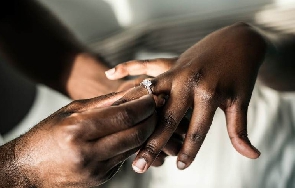Surfing the Internet, I saw a post by BigGodwin Martey, who is a young entrepreneur who has made major strides in the Tech industry. Being a mentor to a lot of his followers on Facebook, he shared reactions and responses of another young entrepreneur who was thriving until he got married. He had married early and has since been struggling to live.
The young man admitted he didn't develop himself enough financially before going down the road and he is now a pale shadow of himself.
In Ghana, it is increasingly common to see young people rushing into marriage without being fully prepared emotionally, financially, or otherwise. This premature leap into one of life's most significant commitments often results in long-term hardships, not only for the individuals involved but also for their families and society at large.
For many Ghanaian women, the pressure to marry young is tied to the biological clock. The societal expectation that a woman's value diminishes with age, coupled with the natural decline in fertility, drives many women to settle quickly, often before they are ready.
This urgency can lead to poor decision-making, where compatibility, emotional maturity, and financial stability are overlooked in favor of securing a partner and starting a family.
Some women, aware of the limited time they perceive they have, may manipulate men into marriage, using emotional or societal pressure. This can create marriages that are fundamentally unequal, where the benefits are skewed more heavily toward one party,often the woman while the man bears the financial and emotional burden.
Young men, eager to fulfill societal and familial expectations, often take on massive financial responsibilities to get married. Many resort to loans, depleting their savings or going into debt to fund weddings, dowries, and the initial costs of setting up a household.
The pressure to "settle down" before they are financially stable can be overwhelming, leading to a lifetime of debt and financial instability. Some men never recover from this early financial strain, finding themselves stuck in a cycle of poverty that affects their overall quality of life.
In Ghana, religious institutions and cultural norms play a significant role in shaping attitudes toward marriage and family. Many young couples are encouraged to marry early, with the belief that God will provide and that children are a blessing, as stated in the Bible. While faith and optimism are important, they often lead to unrealistic expectations.
The reality is that marriage and raising children require substantial emotional and financial resources, which many young couples are ill-equipped to handle. The belief that "God will make things better" can delay crucial decision-making and planning, leaving couples unprepared for the challenges ahead.
The hardships of life in Africa further exacerbate the challenges faced by young couples. The economic struggles, lack of opportunities, and societal pressures delay the average youth's life progress by about 10 years.
This delay affects their ability to secure good jobs, build savings, and establish a stable life before marriage. Having children early without adequate preparation only compounds these difficulties, leading to a cycle of poverty and hardship that is difficult to escape.
The rush into marriage without proper preparation often leads to emotional damage. Young couples may find themselves overwhelmed by the responsibilities of marriage and parenthood, which they are not emotionally mature enough to handle. The strain can lead to deep-seated resentments, unhappiness, and even mental health issues.
In many cases, the emotional damage is irreversible, resulting in high rates of divorce or marriages where couples continue to live together as strangers, bound by societal pressure rather than love or companionship.
While early marriage and childbearing have their advantages, such as having more time to spend with your children and the ability to grow together as a couple, these benefits are often overshadowed by the challenges. The lack of emotional maturity, financial stability, and life experience can lead to a life filled with regret, missed opportunities, and unfulfilled potential.
Given the significant challenges that come with early marriage, it is worth considering the benefits of waiting until one is more mature and financially stable. For men, marrying at 40 or after 45(as suggested by Hrh Nahna on facebook) can be more advantageous.
By this age, many men have achieved a level of financial stability and emotional maturity that allows them to better handle the responsibilities of marriage and fatherhood. They are more likely to have a clear understanding of what they want in a partner, and the experience to navigate the complexities of a long-term relationship.
In some cases, the financial struggles that young couples face can lead to infidelity. There are stories of women leaving their husbands in search of a better life, or even staying in the marriage while secretly engaging in relationships with more financially stable men.
Some men are aware of this but feel powerless to change the situation because of their financial constraints. This further deteriorates the emotional and psychological health of the individuals involved and can have a devastating impact on the children.
In conclusion, while marriage and family are important aspects of life, they should not be rushed. The pressures of societal expectations, the biological clock, and cultural beliefs should not override the need for emotional and financial preparedness.
It is crucial for Ghanaian youth to take the time to build a stable foundation before taking on the responsibilities of marriage and parenthood. By waiting until they are more mature and financially secure, they can create a more fulfilling and successful marriage, ultimately improving the quality of life for themselves, their children, and their spouses.
This is my nugget of wisdom and an opinion. May we all find happiness.
Long Live Mother Ghana
Opinions of Sunday, 18 August 2024
Columnist: Dumenu Charles Selorm



















